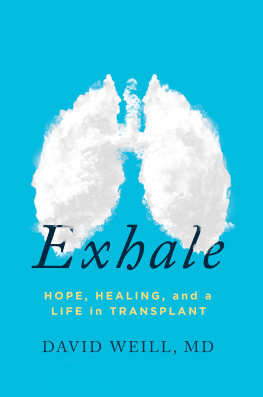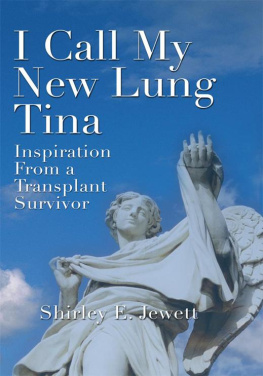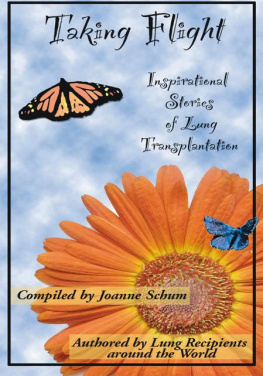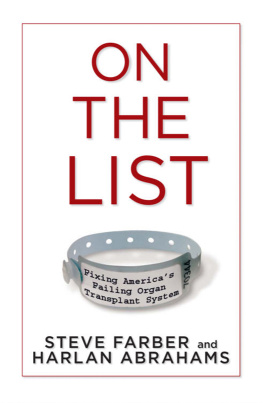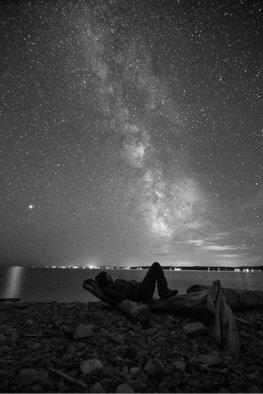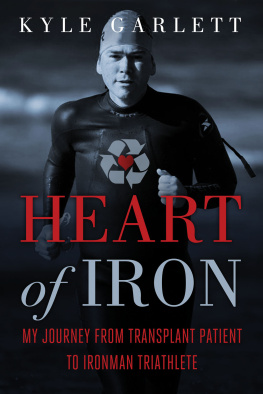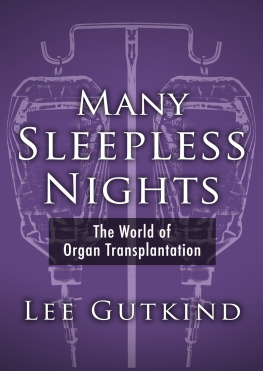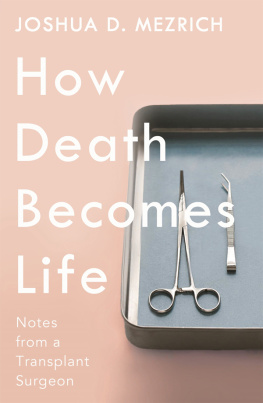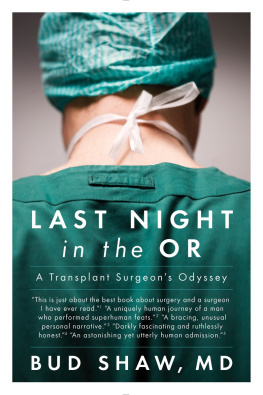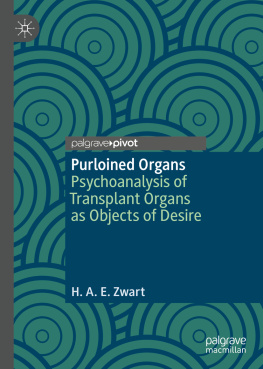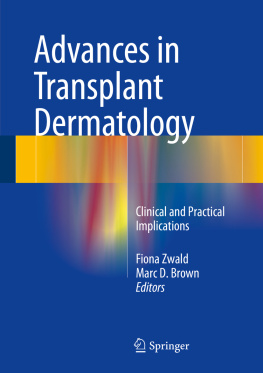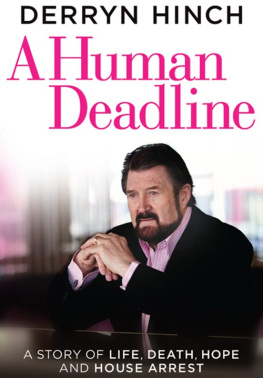
A POST HILL PRESS BOOK
ISBN: 978-1-64293-760-2
ISBN (eBook): 978-1-64293-761-9
Exhale:
Hope, Healing, and a Life in Transplant
2021 by David Weill, MD
All Rights Reserved
Cover art by David Gee
All people, locations, events, and situations are portrayed to the best of the authors memory. While all of the events described are true, many names and identifying details have been changed to protect the privacy of the people
involved.
No part of this book may be reproduced, stored in a retrieval system, or transmitted by any means without the written permission of the author and publisher.

Post Hill Press, LLC
New York Nashville
posthillpress.com
Published in the United States of America
To my daughters, Ava and Hannah, and my wife, Jackiethree people I want most to be proud of me.
To my mother, Kathy, who taught me about the magic of books, a special gift she has given me that is only surpassed by her unconditional love.
And finally, to my father, Hans, who inspired me to believe in myself no matter the circumstance, and to stand up for what I thought was right. All the time. No matter what.
Authors Note
On many occasions, after seeing something at work that is inspiring or upsetting, it has occurred to me what a unique position Ive been in, to be simultaneously so close to both the devastation of death and the wonder of what modern medicine can provide. In the pages that follow, I have tried to give readers a window into that dichotomous experience, to give sight to the daily miracles in our midst.
But heres my bottom line, for those that like to read the ending of a book first: Transplant is a miracle but is, at its essence, a human endeavor, performed by people with strengths and weaknesses, powerful attributes and profound flaws. And I am one of those people.
Patients come to see us expecting consistency and predictability. They expect that we will save their lives. But the doctors, surgeons, and nurses doing transplant work have bad days, bad months, and, unfortunately, even bad years. We have fights with our spouses that put us in surly moods and clashes with our colleagues that often have less to do with patient care than they do with power and ego. We get pissed about being cut off in traffic on the way to work, or show up exhausted after staying up all night with one of our sick children. We are just like everyone else, no better and probably no worse. My mistake, at times, was to believe it when patients would tell me that I was brilliant, a miracle worker, and even worse, a god.
We carry around the stresses of everyday life but also the immense burden of being responsible for saving peoples lives, of being the steward of the waiting list that determines who will get the next precious organ thatoften through a tragedybecomes available. When things went well, the job didnt seem like much of a burden. In fact, it wasnt like having a real jobone where you cant wait until the weekend, or where you always feel underappreciated. Mostly, I couldnt even believe I got paid to do it.
But even when the travails of everyday life interrupt our focus or dampen our moods, we remain responsible for our patients lives. We bear this burden on good days and on bad days, sometimes elegantly and other times, as you shall see, less so.
Each successful transplant brings a wave of euphoria that surges through our bodies, uplifting our spirits and reminding us why we got into this business. But when things go badlyand things do, even in good transplant programsits like having a boulder strapped to our backs and being tossed into a bottomless ocean. At least, thats how it was for me. On those days, they couldnt pay me enough to do it, nor did it comfort me when someone compared me to a deity.
However, through it all, the magic of doing this kind of work for a living is that it means youre giving patients a second chance at life. Helping the courageous patient group I treated was a humbling privilege, and I fought hard to fulfill my duty to them. Showing up for work every day, I made a de facto vow to all my patients: I promised them air .
As you read my story, youll see that this promise wasnt always easy to honor. But doing so has been my lifes work and my most important, imperfect mission.
These pages primarily focus on the ten-year period during which I led the lung transplant program at Stanford University Medical Center. But even before coming to Stanford, when I did transplant work at other hospitals, I saw my colleagues and myself at our best and our worst, both brilliant and imperfect. This book is my story, one Ive waited years to tell. It is my opportunity to share my experiences, in my own words, from my own perspective.
Just a few ground rules. The events and people I describe to you in the book are portrayed the way I experienced them. With some exceptions, Ive changed the names, identities, and other specifics of individuals in order to protect their privacy and integrity, and especially to protect the patients I encountered over the years. The conversations I recreate come from my clear recollections of them, though they should not be taken as word-for-word recitations. Instead, Ive retold them in a way that evokes the feeling and meaning of what was said, in keeping with the true essence, mood, and spirit of the exchanges.
I stand behind the truth of what is depicted. Nonetheless, each one of us has his or her own version of the truth. This is mine.
David Weill
New Orleans
In no relationship is the physician more often derelict than in his duty to himself.
William Osler, M.D., interview at Baylor University Medical Center
We are all fixing what is broken. It is the task of a lifetime.
Abraham Verghese, M.D., Cutting for Stone
Contents
Lucky is the man who does not secretly believe that every possibility is open to him.
Walker Percy, The Last Gentleman
June 2016
Palo Alto, California
I am writing to let you know that Ill be leaving Stanford effective July 1.
Send. No, not yet.
I studied the email again, reading and rereading what I had written in the middle of the previous night.
Sitting in my office at Stanford University on a bright Northern California morning, the sun was all the way up, and I would have given anything to be outside enjoying the beautiful morning. Maybe hiking in the Santa Cruz Mountains or riding my bike up the Pacific Coast Highway. But instead I was stuck inside, trying desperately to get an email out of my outbox.
I needed to pause for a moment, to decide for sure that this was what I wanted to do after all these years, all this effort, all the careful crafting of my career. I looked around at the photos on my deskof my father and mother on their wedding day, my wife Jackie when we were first dating, and the baptism of my younger daughter, Ava. I looked at the poem my older daughter, Hannah, had written in Kindergarten about what it meant to have me as her dad.
I turned back to the computer screen, framed by the brilliant blue sky outside the window behind my desk. I will miss looking outside at the beauty that surrounded me on this campus, but not what surrounded me every day inside this building. I took a slow sip from my stainless steel travel mug, inhaling the deep, sweet aroma of coffee and chicory.
My decision to leave was difficult. I think our team has accomplished a great deal in the ten plus years I have been here. During my decade as Medical Director of the Lung Transplant program, I partnered with many of you to turn around a struggling program and increased the volume of transplants performed while achieving excellent outcomes.
Next page
